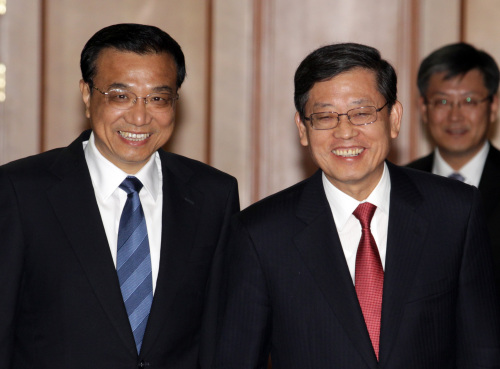Two central banks agree to increase trade settlements in yuan, won
South Korea and China agreed Wednesday to double their won-yuan swap arrangement from the existing $26 billion to $56 billion in an effort to secure foreign exchange liquidity, officials in Seoul said.
The move ramped up Korea’s financial safety net measures following a similar deal reached with Japan last week.
China Vice Premier Li Keqiang met with Korean President Lee Myung-bak and Prime Minister Kim Hwang-sik separately during his visit to Seoul and signed the won-yuan swap deal, extending the current contract for two years till October 2014.
 |
Korean Prime Minister Kim Hwang-sik (right) meets with Chinese Vice Premier Li Keqiang in Seoul on Wednesday. (Yonhap News) |
“The expansion of currency swap agreement prepares to mitigate risks from market uncertainties, and it hopes to eventually increase bilateral trade between Korea and China,” Choi Jong-ku, deputy finance minister for international affairs, said at a news conference.
“Korea has never tapped into the currency swap fund it secured with China and Japan since 2008, and things are likely to stay that way, but both parties could tap into the fund to facilitate trade settlements in the won and yuan,” Choi said.
The two sides agreed to study the possibility of converting all or part of its swap currencies to reserve currencies like the U.S. dollar. Over 80 percent of bilateral trade between the two is settled in the U.S. dollar.
The bilateral agreement is expected to further defuse concerns about Korea’s foreign exchange liquidity as it secures cheaper debt for both Korea and China at a fixed rate. Seoul on Oct. 19 extended its Korea-Japan foreign exchange swap facility from $13 billion to $70 billion in a summit between President Lee Myung-bak and Japanese Prime Minister Yoshihiko Noda.
Extending currency swap lines has been an emerging trend in the region after debt concerns in Europe and U.S. sent shockwaves to Asian markets in August and September. China has secured currency swap facilities with 12 Asian countries including a 200 billion yuan ($31.4 billion) facility with Hong Kong. China’s $56 billion currency swap facility with Korea is its biggest among its 12 deals.
The Korean Finance Ministry had initially said Korea was well prepared to weather more volatility in the currency market and did not a further buffer on top of the $300 billion in foreign exchange reserves.
“Seoul’s official stance is that although Korea is likely to make very little, if any, use of extended swap deals, it is better to prepare for worst case scenarios now as it would be too late to secure deals when things really do hit the fan,” a senior Finance Ministry official said.
By Cynthia J. Kim (cynthiak@heraldcorp.com)







